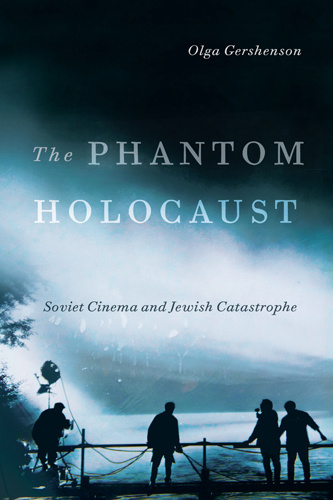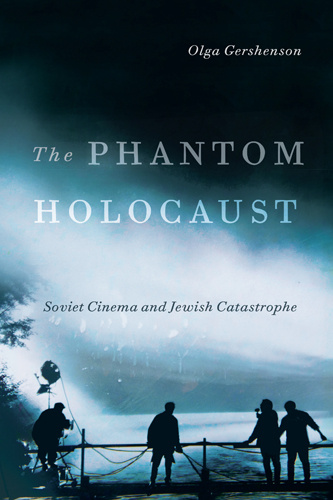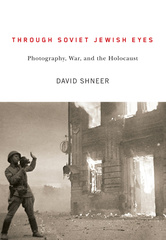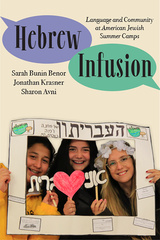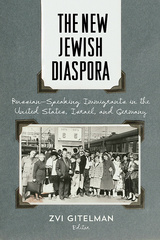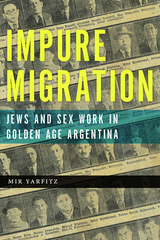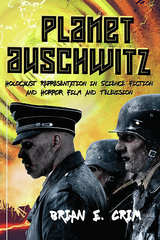The Phantom Holocaust
Soviet Cinema and Jewish Catastrophe
SERIES:
Jewish Cultures of the World
Rutgers University Press
Even people familiar with cinema believe there is no such thing as a Soviet Holocaust film. The Phantom Holocaust tells a different story. The Soviets were actually among the first to portray these events on screens. In 1938, several films exposed Nazi anti-Semitism, and a 1945 movie depicted the mass execution of Jews in Babi Yar. Other significant pictures followed in the 1960s. But the more directly filmmakers engaged with the Holocaust, the more likely their work was to be banned by state censors. Some films were never made while others came out in such limited release that the Holocaust remained a phantom on Soviet screens.
Focusing on work by both celebrated and unknown Soviet directors and screenwriters, Olga Gershenson has written the first book about all Soviet narrative films dealing with the Holocaust from 1938 to 1991. In addition to studying the completed films, Gershenson analyzes the projects that were banned at various stages of production.
The book draws on archival research and in-depth interviews to tell the sometimes tragic and sometimes triumphant stories of filmmakers who found authentic ways to represent the Holocaust in the face of official silencing. By uncovering little known works, Gershenson makes a significant contribution to the international Holocaust filmography.
Focusing on work by both celebrated and unknown Soviet directors and screenwriters, Olga Gershenson has written the first book about all Soviet narrative films dealing with the Holocaust from 1938 to 1991. In addition to studying the completed films, Gershenson analyzes the projects that were banned at various stages of production.
The book draws on archival research and in-depth interviews to tell the sometimes tragic and sometimes triumphant stories of filmmakers who found authentic ways to represent the Holocaust in the face of official silencing. By uncovering little known works, Gershenson makes a significant contribution to the international Holocaust filmography.
'The Phantom Holocaust traces the story of a shadow Soviet film industry that only rarely managed to represent the tragedy that filmmakers, directors, and screenwriters sought to warn against or memorialize. Gershenson’s work is a monumental achievement in giving a voice to the lost Soviet Holocaust films—to the filmmakers, and to also the millions whose fates they attempted to memorialize.'
A pioneering book on the history of Holocaust representation in Soviet cinema. Gershenson's book unearths much about the history of the cinematic representation of the Holocaust beyond Hollywood's iconic take on the subject, tracing—and occasionally breathing new life into—the phantoms that the Soviet cinema industry has left behind.
Nearly a dozen long-lost, rarely seen Soviet films and scores of screenplays that were never produced about the persecution of Jews during World War II have been revived to offer decades-old evidence of a side of the Holocaust few people recognize today. From the dusty archives of Moscow and elsewhere across Russia, the works are featured in The Phantom Holocaust, a startling new book.
The story of the Holocaust, as told by Soviet filmmakers, is very different from the Hollywood versions shown on U.S. movie screens. The Russian films were not about concentration camps, ghettos, and deportations, for that was not the doom to befall Soviet Jews. Rather, in Soviet films that were made about World War II, a viewer had to read between the linesto catch the subtle, almost hidden messages that the screenwriters and film directors managed to get past the censors. Olga Gershenson has interviewed those filmmakers and spent many months digging through censors’ documents and film critics’ reviews of their films for her new book The Phantom Holocaust: Soviet Cinema and Jewish Catastrophe.
The first voice in an important conversation about an entirely new canon in the history of film.
This knowledgeable researched history of the Holocaust in Soviet and Russian cinema is a voyage into the unknown. Olga Gershenson not only tells us about those few movies that exist but those that were unmade and those that could never be made.
In this work of prodigious scholarship, Gershenson makes an important contribution to the depiction of the Holocaust in the Soviet Union. Highly recommended.
'The Phantom Holocaust traces the story of a shadow Soviet film industry that only rarely managed to represent the tragedy that filmmakers, directors, and screenwriters sought to warn against or memorialize. Gershenson’s work is a monumental achievement in giving a voice to the lost Soviet Holocaust films—to the filmmakers, and to also the millions whose fates they attempted to memorialize.'
A pioneering book on the history of Holocaust representation in Soviet cinema. Gershenson's book unearths much about the history of the cinematic representation of the Holocaust beyond Hollywood's iconic take on the subject, tracing—and occasionally breathing new life into—the phantoms that the Soviet cinema industry has left behind.
Nearly a dozen long-lost, rarely seen Soviet films and scores of screenplays that were never produced about the persecution of Jews during World War II have been revived to offer decades-old evidence of a side of the Holocaust few people recognize today. From the dusty archives of Moscow and elsewhere across Russia, the works are featured in The Phantom Holocaust, a startling new book.
The story of the Holocaust, as told by Soviet filmmakers, is very different from the Hollywood versions shown on U.S. movie screens. The Russian films were not about concentration camps, ghettos, and deportations, for that was not the doom to befall Soviet Jews. Rather, in Soviet films that were made about World War II, a viewer had to read between the linesto catch the subtle, almost hidden messages that the screenwriters and film directors managed to get past the censors. Olga Gershenson has interviewed those filmmakers and spent many months digging through censors’ documents and film critics’ reviews of their films for her new book The Phantom Holocaust: Soviet Cinema and Jewish Catastrophe.
The first voice in an important conversation about an entirely new canon in the history of film.
This knowledgeable researched history of the Holocaust in Soviet and Russian cinema is a voyage into the unknown. Olga Gershenson not only tells us about those few movies that exist but those that were unmade and those that could never be made.
In this work of prodigious scholarship, Gershenson makes an important contribution to the depiction of the Holocaust in the Soviet Union. Highly recommended.
Despite its tragic subject, this is an entertaining book, rich in vivid details and narrative turns.
OLGA GERSHENSON is an associate professor in the Judaic and Near Eastern Studies Department at the University of Massachusetts, Amherst. She is the author of Gesher: Russian Theater in Israel and editor of Ladies and Gents: Public Toilets and Gender.
Acknowledgments — ix
1 Screening the Holocaust in the Soviet Union:
Jews without the Holocaust and the
Holocaust without the Jews — 1
2 Soviet Antifascist Films of the 1930s:
The Earliest Images of Nazi Anti-Semitism and
Concentration Camps on World Screens — 13
3 The First Phantom: I Will Live! (1942) — 29
4 How a Soviet Novel Turned into a Jewish Film:
The First Depiction of the Holocaust on Soviet
Screens, The Unvanquished (1945) — 40
5 The Holocaust on the Thawing Screens: From The Fate
of a Man (1959) to Ordinary Fascism (1965) — 57
6 The Holocaust at the Lithuanian Film Studio:
Gott mit Uns (1961) — 71
7 The Holocaust without the Jews:
Steps in the Night (1962) and Other Films — 82
8 Kalik versus Goskino: Goodbye, Boys! (1964/1966) — 91
9 Stalemate (1965) between the Filmmaker
and the Censors — 102
10 Kalik’s Last Phantom: King Matt and the
Old Doctor (1966) — 115
11 The Film That Cost a Career: Eastern Corridor (1966) — 127
12 Muslims Instead of Musslmans: Sons of
the Fatherland (1968) — 145
13 Commissar (1967/1988): The End of the Thaw — 158
14 An Alternative Track: Jewish Soldiers
Fighting on Soviet Screens — 173
15 The Last Phantom—the First Film:
Our Father (1966/1990) — 190
viii Contents
16 Perestroika and Beyond: Old Wine in New Bottles? — 206
17 Conclusions — 223
Abbreviations and Acronyms — 229
Notes — 231
Index — 269
1 Screening the Holocaust in the Soviet Union:
Jews without the Holocaust and the
Holocaust without the Jews — 1
2 Soviet Antifascist Films of the 1930s:
The Earliest Images of Nazi Anti-Semitism and
Concentration Camps on World Screens — 13
3 The First Phantom: I Will Live! (1942) — 29
4 How a Soviet Novel Turned into a Jewish Film:
The First Depiction of the Holocaust on Soviet
Screens, The Unvanquished (1945) — 40
5 The Holocaust on the Thawing Screens: From The Fate
of a Man (1959) to Ordinary Fascism (1965) — 57
6 The Holocaust at the Lithuanian Film Studio:
Gott mit Uns (1961) — 71
7 The Holocaust without the Jews:
Steps in the Night (1962) and Other Films — 82
8 Kalik versus Goskino: Goodbye, Boys! (1964/1966) — 91
9 Stalemate (1965) between the Filmmaker
and the Censors — 102
10 Kalik’s Last Phantom: King Matt and the
Old Doctor (1966) — 115
11 The Film That Cost a Career: Eastern Corridor (1966) — 127
12 Muslims Instead of Musslmans: Sons of
the Fatherland (1968) — 145
13 Commissar (1967/1988): The End of the Thaw — 158
14 An Alternative Track: Jewish Soldiers
Fighting on Soviet Screens — 173
15 The Last Phantom—the First Film:
Our Father (1966/1990) — 190
viii Contents
16 Perestroika and Beyond: Old Wine in New Bottles? — 206
17 Conclusions — 223
Abbreviations and Acronyms — 229
Notes — 231
Index — 269

